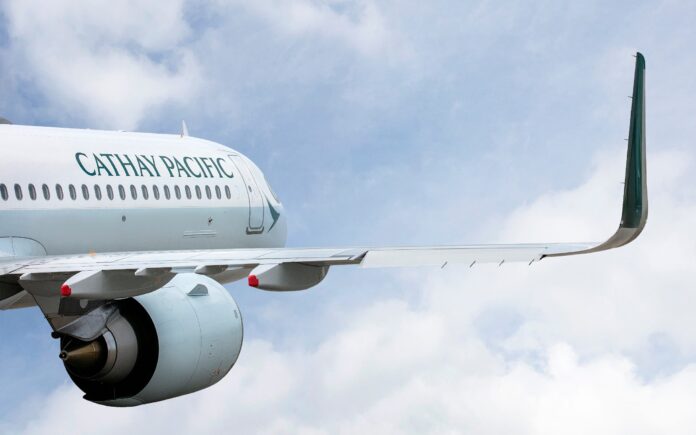
-
Cathay Pacific partners with corporates in Sustainable Aviation Fuel program
-
The SAF Program enlists corporate customers’ role in a project that aims to cut their carbon footprint from business travel or airfreight activity
-
The carrier will use on its aircraft used cooking oil and animal fat waste processed into fuel by PetroChina and Shell
-
SAF can cut up to 100% carbon emissions on an aircraft lifecycle basis, depending on the technology used
Cathay Pacific is launching its pilot Corporate Sustainable Aviation Fuel (SAF) Program, which provides corporate customers the opportunity to reduce their carbon footprint from business travel or airfreight, the Hong Kong flag-carrier said on April 20.
The airline in a statement said the program is the first of its kind in Asia that taps its corporate clients’ participation in its use of SAF, uplifted for the first time from Hong Kong International Airport, on Cathay Pacific flights.
SAF used for the program launch comes from used cooking oil and animal fat waste. It is made available to the airline by its Corporate SAF Program fuel suppliers PetroChina and Shell.
SAF is the most important way to decarbonize airline operations before alternatively fueled aircraft can be widely deployed in commercial operations, the carrier said. It claims SAF can cut up to 100% carbon emissions on a jet’s lifecycle basis, depending on technology used.
The first uplift of SAF at HKIA is made possible through collaboration with many stakeholders along the supply chain and various government departments.
The airline said it is kick-starting the program with eight corporates as launch customers. These are AIA, Airport Authority Hong Kong (AAHK), DHL Global Forwarding, HSBC, Kintetsu World Express (KWE), PwC China, Standard Chartered, and Swire Pacific.
As leaders in corporate climate action, the launch customers are committed to reducing the climate impact of their business travel and/or airfreight activities by helping facilitate wider adoption of renewable energy by the air transport industry through the use of SAF.
“We continue to pioneer our industry’s move towards more substantial use of SAF, especially in Asia,” Cathay Pacific’s chief executive Augustus Tang said.
“Last year, we were among the first carriers in the world to announce a target of 10% SAF for our total fuel use by 2030. We have made significant progress since then and are pleased that uplifting SAF from HKIA is now a reality with the strong support of the local authorities and fuel suppliers.”
Tang said aside from the launch corporate customers, Cathay Pacific has received enthusiastic response from other corporates.
He said Cathay Pacific sees the launch of the corporate SAF program as an important step for it to engage other like-minded organizations and a first step in sending an important demand signal to the SAF supply chain that there is firm interest in the region, not only from airlines, but also the aviation value-chain all the way to end users of both passenger and cargo transportation.




